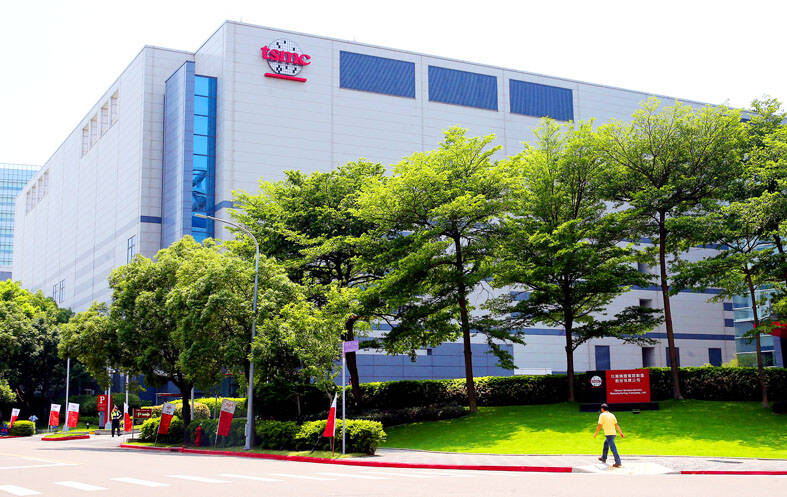Taipei-Hsinchu was the world’s 25th-largest science and technology (S&T) cluster this year, up from 27th last year, according to the Global Innovation Index 2024 released on Tuesday by the UN’s World Intellectual Property Organization (WIPO).
Each year, WIPO publishes a ranking of the top 100 clusters using patent application and scientific publication data to identify local concentrations of world-leading S&T activities.
Since 2016, the index has employed a bottom-up approach to identifying clusters.

Photo: CNA
The methodology disregards administrative or political borders and instead focuses on geographical areas that boast a high density of inventors and scientific authors, WIPO said.
As one of the three science parks in Taiwan, the Hsinchu Science Park (新竹科學園區) is home to many tech giants, including contract chipmaker Taiwan Semiconductor Manufacturing Co (台積電), which has been the country’s largest patent applicant for years.
Tokyo-Yokohama in Japan retained the title as the world’s top-performing tech hub, followed by China’s Shenzhen-Hong Kong-Guangzhou, whose ranking remained unchanged.
WIPO said the top two clusters benefited from a large number of patents filed by Mitsubishi Electric Corp in Tokyo and Huawei Technologies Co (華為) in Shenzhen, China.
Beijing came in third, followed by Seoul, Shanghai-Suzhou in China, San Jose-San Francisco in the US, Osaka-Kobe-Kyoto in Japan, Boston-Cambridge in the US, Nanjing, China, and San Diego, California.
The country with the most S&T clusters was China, which held 26 of the top 100 spots.
The US was second with 20.

MULTIFACETED: A task force has analyzed possible scenarios and created responses to assist domestic industries in dealing with US tariffs, the economics minister said The Executive Yuan is tomorrow to announce countermeasures to US President Donald Trump’s planned reciprocal tariffs, although the details of the plan would not be made public until Monday next week, Minister of Economic Affairs J.W. Kuo (郭智輝) said yesterday. The Cabinet established an economic and trade task force in November last year to deal with US trade and tariff related issues, Kuo told reporters outside the legislature in Taipei. The task force has been analyzing and evaluating all kinds of scenarios to identify suitable responses and determine how best to assist domestic industries in managing the effects of Trump’s tariffs, he

TIGHT-LIPPED: UMC said it had no merger plans at the moment, after Nikkei Asia reported that the firm and GlobalFoundries were considering restarting merger talks United Microelectronics Corp (UMC, 聯電), the world’s No. 4 contract chipmaker, yesterday launched a new US$5 billion 12-inch chip factory in Singapore as part of its latest effort to diversify its manufacturing footprint amid growing geopolitical risks. The new factory, adjacent to UMC’s existing Singapore fab in the Pasir Res Wafer Fab Park, is scheduled to enter volume production next year, utilizing mature 22-nanometer and 28-nanometer process technologies, UMC said in a statement. The company plans to invest US$5 billion during the first phase of the new fab, which would have an installed capacity of 30,000 12-inch wafers per month, it said. The

Taiwan’s official purchasing managers’ index (PMI) last month rose 0.2 percentage points to 54.2, in a second consecutive month of expansion, thanks to front-loading demand intended to avoid potential US tariff hikes, the Chung-Hua Institution for Economic Research (CIER, 中華經濟研究院) said yesterday. While short-term demand appeared robust, uncertainties rose due to US President Donald Trump’s unpredictable trade policy, CIER president Lien Hsien-ming (連賢明) told a news conference in Taipei. Taiwan’s economy this year would be characterized by high-level fluctuations and the volatility would be wilder than most expect, Lien said Demand for electronics, particularly semiconductors, continues to benefit from US technology giants’ effort

‘SWASTICAR’: Tesla CEO Elon Musk’s close association with Donald Trump has prompted opponents to brand him a ‘Nazi’ and resulted in a dramatic drop in sales Demonstrators descended on Tesla Inc dealerships across the US, and in Europe and Canada on Saturday to protest company chief Elon Musk, who has amassed extraordinary power as a top adviser to US President Donald Trump. Waving signs with messages such as “Musk is stealing our money” and “Reclaim our country,” the protests largely took place peacefully following fiery episodes of vandalism on Tesla vehicles, dealerships and other facilities in recent weeks that US officials have denounced as terrorism. Hundreds rallied on Saturday outside the Tesla dealership in Manhattan. Some blasted Musk, the world’s richest man, while others demanded the shuttering of his